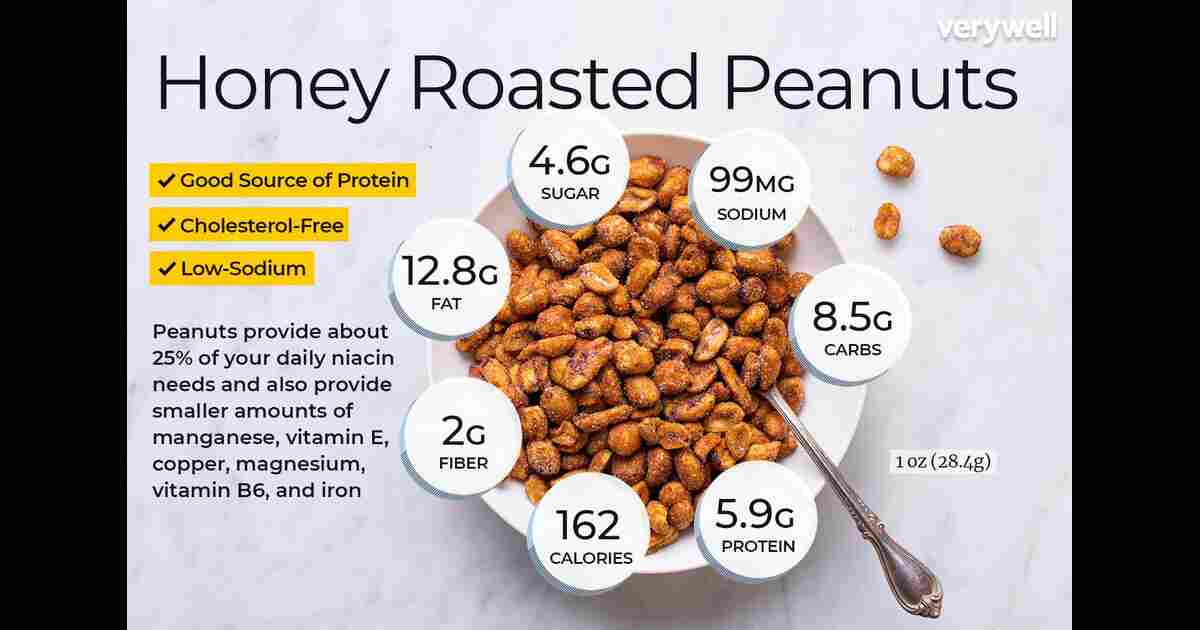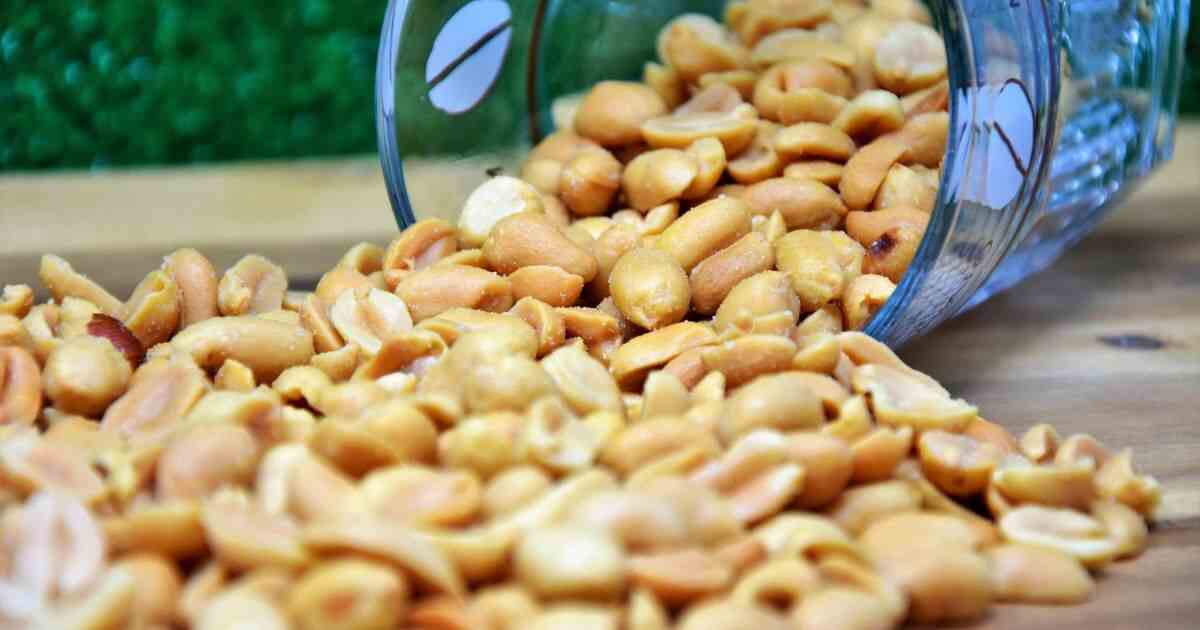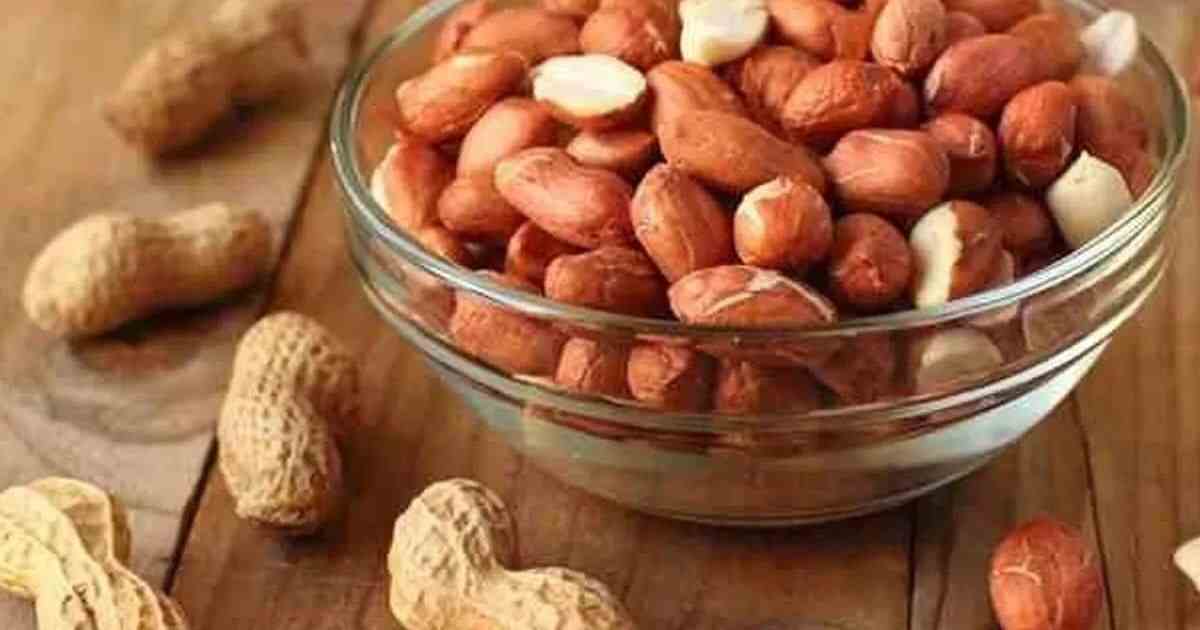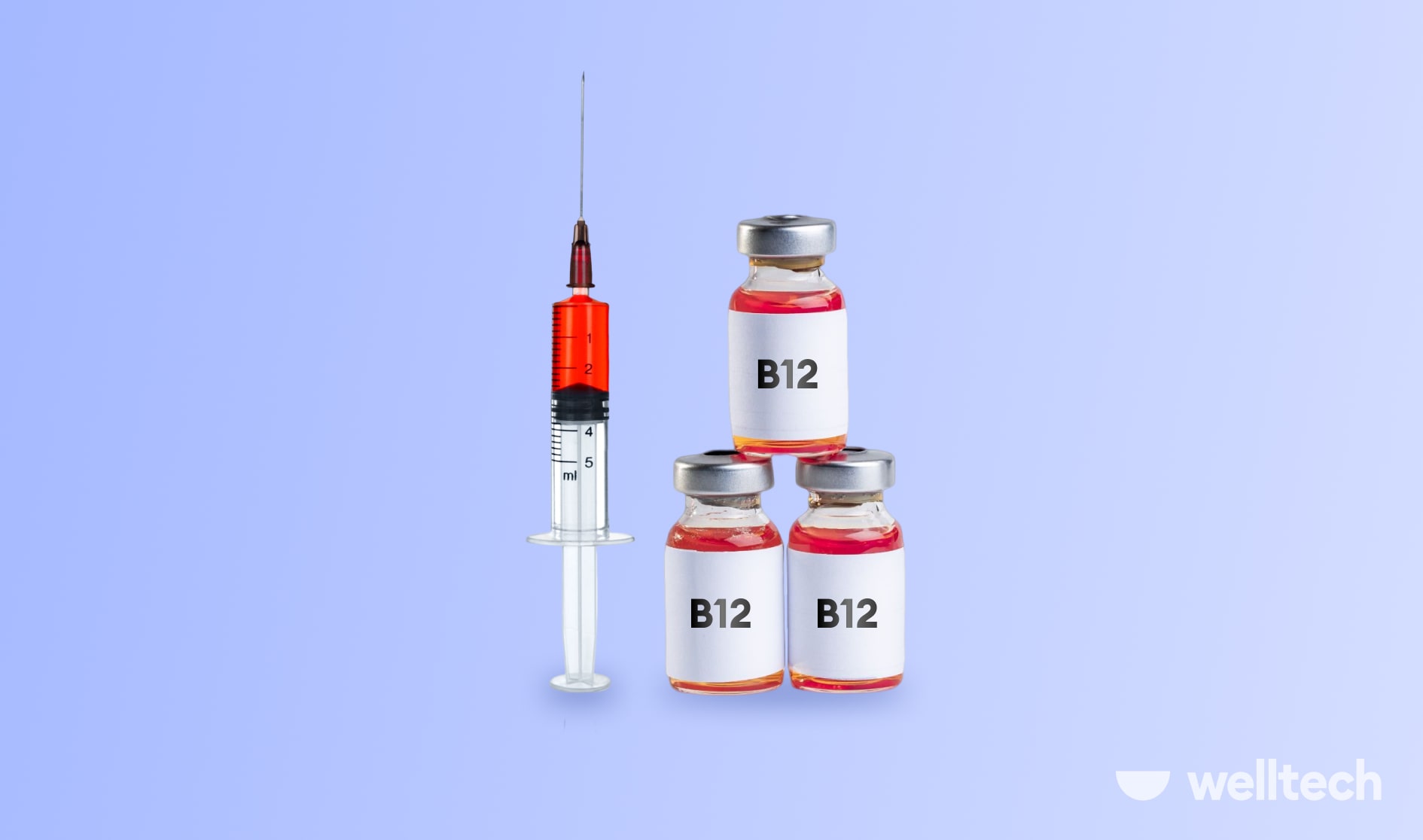Peanuts are a nutritious food that is rich in protein, healthy fats, vitamins, and minerals, making them a valuable addition to a balanced diet. Peanuts are a versatile and delicious snack that offers a range of nutritional benefits.
Table of Contents
Packed with protein, healthy fats, vitamins, and minerals, they are a great source of energy and can support muscle growth and repair. Peanuts are also rich in antioxidants, which help to protect the body against cell damage and reduce inflammation.
Additionally, they contain fiber, which aids digestion and promotes a feeling of fullness. With their impressive nutritional profile, peanuts make a healthy and satisfying snack option for anyone looking to enhance their overall well-being. Whether enjoyed on their own or incorporated into recipes, peanuts are a tasty way to boost your nutrient intake.
Understanding The Nutritional Profile Of Peanut
Discover the complete nutritional profile of peanuts, including their impressive protein, fiber, and healthy fat content. These nutrient-packed legumes are also rich in essential minerals like magnesium and potassium, making them a wholesome addition to any diet.
Overview Of The Nutritional Composition Of Peanut
Peanuts, also known as groundnuts, are a popular and versatile legume that packs a punch when it comes to nutrition. These tiny but mighty nuts are jam-packed with essential nutrients that make them a healthy addition to any diet. Here’s a breakdown of the nutritional profile of peanuts:
Highlighting The Key Nutrients Found In Peanut
- Protein: Peanuts are an excellent source of plant-based protein, making them a great choice for vegetarians and vegans. They contain all nine essential amino acids necessary for muscle repair and growth.
- Healthy Fats: Peanuts are high in monounsaturated and polyunsaturated fats, which are considered heart-healthy fats. These fats help reduce bad cholesterol levels and lower the risk of heart disease.
- Fiber: With their high fiber content, peanuts promote digestive health and help maintain bowel regularity. Fiber also aids in weight management by promoting a feeling of fullness.
- Vitamins: Peanut is packed with important vitamins such as vitamin E, B vitamins (including folic acid), and niacin. These vitamins play crucial roles in maintaining overall health and supporting various bodily functions.
- Minerals: Peanut is a good source of several essential minerals, including magnesium, zinc, phosphorus, and potassium. These minerals are necessary for bone health, energy production, and maintaining a healthy nervous system.

Exploring The Micronutrients Present In Peanut
- Antioxidants: Peanuts are rich in antioxidants, including resveratrol, which is known for its anti-inflammatory properties. Antioxidants help protect the body against oxidative stress and may reduce the risk of chronic diseases.
- Plant Compounds: Peanut skins contain various plant compounds such as phytic acid and phytosterols. These compounds have been linked to lower cholesterol levels, reduced cancer risk, and improved heart health.
- Arginine: Peanuts are an excellent source of arginine, an amino acid that plays a crucial role in immune function, wound healing, and blood vessel health.
- Phytochemicals: Peanuts contain phytochemicals like phytostanols and phytosaponins, which have been associated with reduced risk of certain cancers and improved brain function.
Incorporating peanuts into your diet can provide a wide array of essential nutrients, making them not only a delicious snack but also a nutritious choice. So go ahead and enjoy a handful of peanuts knowing that you’re treating your body to a nutrient powerhouse!
Health Benefits Of Peanut
Discover the nutritional values of peanuts and reap their incredible health benefits. Packed with essential nutrients like protein, fiber, and heart-healthy fats, peanuts can support weight management, enhance heart health, and provide a natural source of energy.
Exploring The Positive Impact Of Peanut On Heart Health:
- Peanuts are rich in monounsaturated and polyunsaturated fats, which can help lower bad cholesterol levels and reduce the risk of heart disease.
- The high levels of resveratrol, a powerful antioxidant found in peanuts, can improve blood flow and prevent blood clots, ultimately benefiting heart health.
- Peanut is a great source of arginine, an amino acid that helps relax blood vessels and improve overall heart function.
- The presence of magnesium in peanuts aids in regulating blood pressure and maintaining a healthy cardiovascular system.
Discussing The Relation Between Peanuts And Weight Management:
- Despite being calorie-dense, studies have shown that including peanuts in your diet can help with weight management and even weight loss.
- The high protein and fiber content in peanuts promote satiety, making you feel fuller for longer and reducing cravings.
- Peanut also contain healthy fats that can increase your metabolism, enabling your body to burn calories more efficiently.
- Including peanut in a balanced diet can help control hunger and prevent overeating, thus contributing to weight management goals.
Highlighting The Potential Role Of Peanut In Reducing The Risk Of Certain Diseases:
- Regular consumption of peanuts has been linked to a lower risk of developing certain chronic diseases, such as type 2 diabetes and certain types of cancer.
- The antioxidants present in peanuts, such as resveratrol and vitamin E, help neutralize harmful free radicals, which play a significant role in disease development.
- Peanut is a rich source of various nutrients, including B vitamins, magnesium, and folate, which contribute to overall health and may help reduce the risk of certain diseases.
- The synergistic combination of nutrients found in peanuts may potentially promote optimal health and reduce the risk of chronic diseases when consumed as part of a balanced diet.
Incorporating peanuts into your diet can have several health benefits, particularly in terms of heart health, weight management, and reducing the risk of certain diseases. By making peanuts a regular part of your meals and snacks, you can reap the nutritional rewards they offer and enjoy a delicious and wholesome addition to your diet.
Incorporating Peanut Into A Balanced Diet
Peanuts offer a variety of nutritional benefits that can be easily incorporated into a balanced diet. With their high protein, fiber, and healthy fat content, peanuts can provide a satisfying and nutritious addition to meals and snacks.

Providing Tips On Incorporating Peanut Into Everyday Meals:
- Peanut butter and jelly sandwiches: Spread a generous amount of peanut butter on whole-grain bread and top with a natural fruit spread for a delicious and nutritious lunch option.
- Thai-inspired peanut stir-fry: Sauté your favorite vegetables in a pan, then add a splash of soy sauce and a dollop of peanut butter for a tasty and protein-packed twist on a classic stir-fry.
- Peanut-crusted chicken: Coat chicken breasts in crushed peanuts and bake until golden brown for a flavorful and crunchy main dish.
- Peanut sauce for noodles: Whip up a simple peanut sauce by combining peanut butter, soy sauce, lime juice, and a touch of honey. Toss with cooked noodles and fresh veggies for a quick and satisfying meal.
Sharing Healthy Snack Ideas Using Peanuts:
- Ants on a log: Spread peanut butter onto celery sticks and top with raisins for a fun and nutritious snack that kids will love.
- Peanut trail mix: Mix peanuts with dried fruits, such as cranberries or apricots, and whole-grain cereal for an energizing and portable snack.
- Peanut butter and banana bites: Slice bananas and spread peanut butter between the slices for a quick and satisfying treat.
- Peanut yogurt dip: Combine peanut butter with Greek yogurt, a drizzle of honey, and a sprinkle of cinnamon for a protein-packed dip to enjoy with sliced apples or carrot sticks.
Discussing Portion Control And Moderation When Consuming Peanuts:
- Stick to recommended serving sizes: Aim to consume about one ounce or a small handful of peanuts as a serving. This helps to avoid excess calorie intake while still benefiting from their nutritional value.
- Incorporate peanuts as a part of a balanced diet: While peanuts are rich in healthy fats and protein, it is important to enjoy them in conjunction with other nutritious foods to maintain a well-rounded diet.
- Be mindful of added ingredients: Some commercially available peanut products may contain added sugars or unhealthy fats. Check labels and opt for natural and minimally processed options when possible.
- Practice moderation: While peanuts offer numerous health benefits, consuming them in excess may lead to unwanted weight gain. Balance your intake with other food groups to ensure a balanced diet.
Remember, peanuts can add flavor, texture, and nutritional benefits to a variety of meals and snacks. By following these tips and incorporating peanuts into your everyday diet in moderation, you can enjoy their benefits while maintaining a balanced and healthy lifestyle.
Peanut Butter: A Nutritious Option?
Peanut butter offers a nutritious option due to its high nutritional value, packed with protein, healthy fats, and essential minerals like magnesium and potassium. It is also a good source of antioxidants, fiber, and vitamins, making it a popular choice for a balanced diet.
Understanding The Nutritional Value Of Peanut Butter
Peanut butter is a delicious and creamy spread that is loved by many. But is it really a nutritious option? Let’s dive into the nutritional value of peanut butter and find out:
- High in protein: Peanut butter is an excellent source of protein, making it a great addition to vegetarian or vegan diets. It contains about 25 grams of protein per 100 grams, which helps in muscle repair and growth.
- Good source of healthy fats: While peanut butter may be high in calories, most of those calories come from healthy fats. These fats are heart-healthy and play a vital role in maintaining overall health.
- Rich in vitamins and minerals: Peanut butter contains a range of essential vitamins and minerals, including vitamin E, magnesium, phosphorus, and potassium. These nutrients are important for various bodily functions and contribute to overall well-being.
Highlighting The Differences Between Natural And Processed Peanut Butter
Not all peanut butter is created equal. There are two main types: natural and processed peanut butter. Let’s explore the differences between them:
Natural peanut butter:
- Made from 100% peanuts: Natural peanut butter typically contains only peanuts and maybe a small amount of salt. It doesn’t contain any added oils, sugars, or preservatives.
- Separation may occur: Natural peanut butter tends to separate, with the oil rising to the top. This is normal, and you just need to give it a good stir before using.
- Nutrient-rich: As natural peanut butter only contains peanuts, it retains all the natural nutrients and healthy fats found in peanuts.
Processed peanut butter:
- Contains additives: Processed peanut butter often contains additives, such as hydrogenated oils, sugar, and salt. These additives can affect its nutritional value.
- Creamier texture: Processed peanut butter tends to have a smoother and creamier texture. This can be appealing for those who prefer a smoother spread.
- Longer shelf life: Due to the additives used, processed peanut butter typically has a longer shelf life compared to natural peanut butter.
Discussing The Potential Benefits And Drawbacks Of Consuming Peanut Butter
While peanut butter has its nutritional merits, there are also some potential benefits and drawbacks to consider:
Benefits:
- Source of energy: Peanut butter is calorie-dense and provides a quick source of energy. This can be beneficial for active individuals or those looking for a boost of energy.
- Heart-healthy fats: The healthy fats in peanut butter, such as monounsaturated fats, may help lower bad cholesterol levels and reduce the risk of heart disease.
- Fiber content: Peanut butter contains dietary fiber, which aids in digestion and helps maintain a healthy gut.
Drawbacks:
- Calorie-dense: Peanut butter is high in calories, so portion control is essential, especially for those watching their weight.
- Allergies: Peanut butter is a common allergen, and individuals with peanut allergies should avoid it completely.
- Sugar and sodium content: Processed peanut butter can be high in added sugars and sodium, which should be monitored, especially for individuals with dietary restrictions.
Peanut butter can indeed be a nutritious option, but it’s crucial to choose natural options and practice moderation. Enjoy it as part of a balanced diet to reap its health benefits without overindulging.
Peanuts Allergies: Prevalence And Management
Peanut allergies are a prevalent concern in today’s society. It’s important to understand the nutritional values of peanuts and how to manage allergies for a healthier life.
Discussing The Prevalence Of Peanut Allergies
Peanut allergies have become increasingly prevalent in recent years, affecting a significant number of individuals worldwide. Here is an overview of the prevalence of peanut allergies:
- Peanut allergies are one of the most common food allergies in both children and adults.
- Roughly 1-2% of children and 0.6% of adults are estimated to have peanut allergies.
- It is important to note that peanut allergies tend to persist into adulthood, with only a small percentage of individuals outgrowing the allergy over time.
Highlighting The Signs And Symptoms Of Peanut Allergies
Recognizing the signs and symptoms of peanut allergies is essential for early detection and proper management. Here are some common indicators to look out for:
- Skin reactions: Individuals with peanut allergies might experience hives, itching, or a rash upon contact with peanuts or peanut products.
- Digestive issues: Symptoms such as abdominal pain, nausea, vomiting, or diarrhea may occur.
- Respiratory problems: Allergic reactions may lead to difficulties in breathing, such as wheezing, coughing, or shortness of breath.
- Anaphylaxis: In severe cases, anaphylaxis may develop, causing a potentially life-threatening reaction that includes a sudden drop in blood pressure, swelling of the throat, and loss of consciousness.
Addressing Management Strategies For Individuals With Peanut Allergies
Proper management is crucial in ensuring the well-being of individuals with peanut allergies. Here are some effective strategies to consider:
- Avoidance: Completely avoiding peanuts and peanut products is the most important step in managing a peanut allergy. This includes reading food labels carefully and being cautious while eating out.
- Medications: Epinephrine auto-injectors (such as EpiPen) should be carried by individuals with a known peanut allergy at all times. These devices can provide emergency treatment in case of severe allergic reactions.
- Education and Communication: It is essential for individuals with peanut allergies to educate their close contacts, such as family members, friends, teachers, and caregivers, on how to recognize and respond to an allergic reaction.
- Allergist consultation: Regular consultations with an allergist can help monitor the progression of the allergy and provide guidance on managing symptoms effectively.
Remember, peanut allergies can vary in severity from person to person. If you suspect a peanut allergy, it is crucial to consult a healthcare professional for accurate diagnosis and personalized advice on managing the allergy.
Cooking With Peanuts: Delicious And Nutritious Recipes
Discover the delightful and nutritious world of cooking with peanuts. These recipes offer a taste of the nutritional values found in peanuts, making them an ideal ingredient for a healthy and flavorful meal.
Peanut is not only a popular snack but also a versatile ingredient that can add a delightful flavor to various dishes. Whether you’re a seasoned chef or just starting your culinary journey, cooking with peanuts opens up a world of delicious and nutritious possibilities.
In this section, we’ll explore some popular recipes that incorporate peanuts, provide variations for different dietary preferences, and share tips and suggestions for cooking with this flavorful ingredient.
Sharing Popular Recipes That Incorporate Peanuts
- Thai Peanut Noodles: Combine cooked noodles, sautéed vegetables, and a deliciously creamy peanut sauce for a quick and satisfying meal. Top it off with some crushed peanut for added crunch.
- Peanut Butter and Jelly Smoothie: Blend together peanut butter, mixed berries, banana, and almond milk for a refreshing and protein-packed smoothie that will keep you energized throughout the day.
- African Peanut Stew: This hearty stew features a combination of peanut, vegetables, spices, and protein-rich beans. It’s a vibrant and flavorful dish that will warm you up on a chilly evening.
- Peanut-crusted Chicken: For a twist on traditional chicken recipes, coat your chicken breasts with crushed peanuts before baking or frying. The result is a crunchy and delicious outer layer that pairs perfectly with a dipping sauce.
Providing Variations For Different Dietary Preferences
- Gluten-free options: Substitute wheat-based products with alternatives like rice noodles, gluten-free bread, or gluten-free flour in recipes that call for peanuts.
- Vegan and vegetarian adaptations: Replace meat with tofu, tempeh, or seitan in recipes containing peanuts for a plant-based alternative that is still packed with protein and flavor.
- Allergen-friendly alternatives: If you or your guests have peanut allergies, consider using almond butter, cashew butter, or sunflower seed butter as a substitute in recipes. Ensure that all ingredients are free from peanuts to avoid cross-contamination.
Tips And Suggestions For Cooking With Peanuts
- Roasting peanuts: Enhance the natural flavors of peanuts by roasting them in the oven at 350°F for about 10-15 minutes or until they turn golden brown. Let them cool before using them in recipes to add a delightful crunch.
- Making homemade peanut butter: Blend roasted peanuts in a food processor until smooth, adding a touch of salt and a drizzle of honey or your preferred sweetener for a tasty homemade peanut butter spread.
- Experimenting with peanut flavors: Try using different types of peanuts like Spanish peanut, redskin peanuts, or honey-roasted peanuts to add unique flavors and textures to your dishes.
- Pairing peanuts with other ingredients: Peanut pair well with ingredients like lime, ginger, soy sauce, chili, and coconut milk. Experiment with these flavor combinations to create exciting and delicious dishes.
Cooking with peanut not only adds a burst of flavor but also provides a nutritional boost to your meals. So, get creative in the kitchen and explore the endless possibilities that this versatile ingredient has to offer!
Frequently Asked Questions Of Peanuts Nutritional Values
Does Peanut Have Any Health Benefits?
Peanuts have many health benefits, like reducing the risk of heart disease and promoting weight loss.
Is It Good To Eat Peanut Every Day?
Yes, it is beneficial to include peanuts in your daily diet due to their numerous health benefits.
What Is The Nutritional Value Of A Peanut?
A peanut is a nutrient-dense food containing protein, healthy fats, vitamins B and E, and minerals like magnesium and potassium.
Is Peanut Better For You Than Almonds?
Peanuts and almonds have different nutritional profiles, so neither is inherently better than the other.
Conclusion
Overall, peanut is a highly nutritious and versatile food that can be enjoyed in a variety of ways. Their rich content of healthy fats, protein, fiber, and essential vitamins and minerals make them a valuable addition to any diet. Whether you prefer them roasted, salted, ground into butter, or used as an ingredient in recipes, peanuts offer both great taste and nutritional benefits.
Their high antioxidant and anti-inflammatory properties have been linked to a range of health benefits, including reduced risk of heart disease, improved brain function, and better weight management. Additionally, peanuts are a convenient and affordable snack option that can be easily incorporated into a balanced diet.
So, next time you reach for a snack, consider grabbing a handful of peanuts and enjoy their delicious taste while nourishing your body with their many nutritional values.




